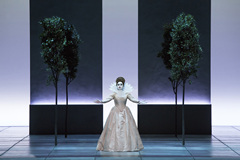| Opera Reviews | 8 May 2024 |
La Scala completes its Monteverdi cycleby Silvia Luraghi |
|
| Monteverdi: L'incoronazione di Poppea Teatro alla Scala, Milan 17 January 2015 |
|
|
The score of this opera has a complex history: no original manuscript exists, and the two available versions, found in Naples and in Venice, display some relevant differences. In the current Milan production the two versions have partly been merged, and also ‘enriched’ with more changes or additions, especially concerning the orchestration and the distribution of vocal timbres. In fact, Monteverdi’s music is not the most suitable for the size of a theater such as La Scala or the Paris Opéra, and this might explain the choices made. Less clear was the reason for choosing male voices for Nero and the Valet, two roles which were sung by tenors rather than the usual sopranos en travesti. The visual aspect of the production was the most compelling. The sets were reduced to a minimum, and the lights, designed by A.J. Weissbard, created the setting with beautiful shadings in a dim, bluish light in which the singers performed the anti-naturalistic moves typical of Wilson’s stage directions in the simple and not especially colorful costumes by Jacques Reynaud, which merged nicely with the lighting. The vocal cast was uneven. Baroque specialists Monica Bacelli in the double role of La Virtù and Ottavia and Sara Mingardo as Poppea’s unhappy lover Ottone sang with great tastefulness, and were arguably the best on stage. Soprano Miah Persson as Poppea and La Fortuna enjoyed a big success, in spite of some difficulties with diction, which in Monteverdi is especially important on account of his style. Tenor Leonardo Cortellazzi did his best as Nero, even though the choice of a male voice was perhaps not the best idea for this production (but this is obviously not the singer’s fault), and bass Andrea Concetti was an authoritative Seneca. Conductor Rinaldo Alessandrini at odds with the large size of the house conducted with great commitment, but the overall effect remained somewhat monotonous. There was a single break, resulting in two ninety minute halves. The house was less full than at more traditional performances, and not all members of the audience were seen going back to their seats after the long intermission, but those remaining seemingly liked the performance, as shown by their applause at the end.
|
|
| Text ©
Silvia Luraghi Photo © Lucie Jansch © Teatro alla Scala |

 With L'incoronazione di Poppea La Scala completed the Claudio Monteverdi cycle, planned by former general manager Stéphane Lissner, which opened in 2009 with L'Orfeo. The whole cycle was directed by Robert Wilson and conducted by Monteverdi specialist Rinaldo Alessandrini. The last title, staged after Lissner’s departure from Milan, has been co-produced with the Opéra national de Paris, the company that he currently manages.
With L'incoronazione di Poppea La Scala completed the Claudio Monteverdi cycle, planned by former general manager Stéphane Lissner, which opened in 2009 with L'Orfeo. The whole cycle was directed by Robert Wilson and conducted by Monteverdi specialist Rinaldo Alessandrini. The last title, staged after Lissner’s departure from Milan, has been co-produced with the Opéra national de Paris, the company that he currently manages. 





